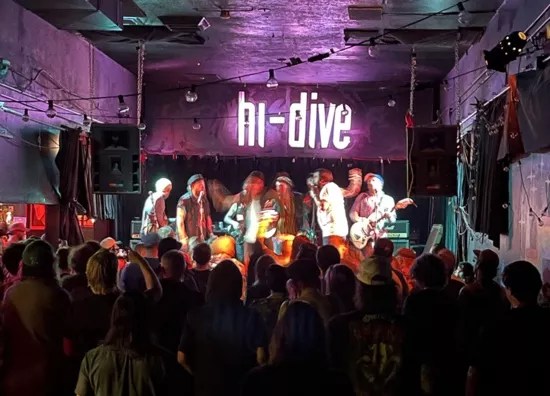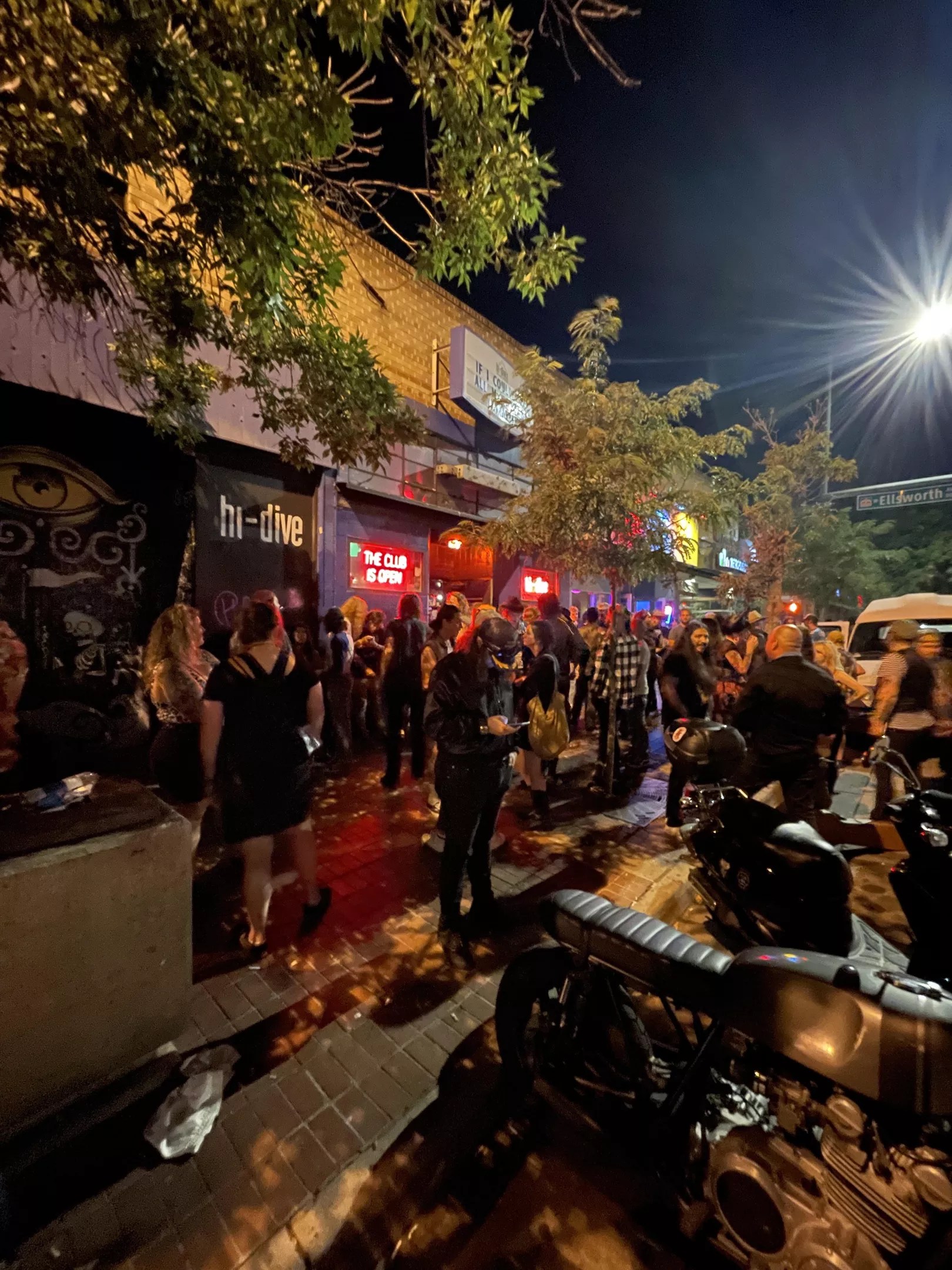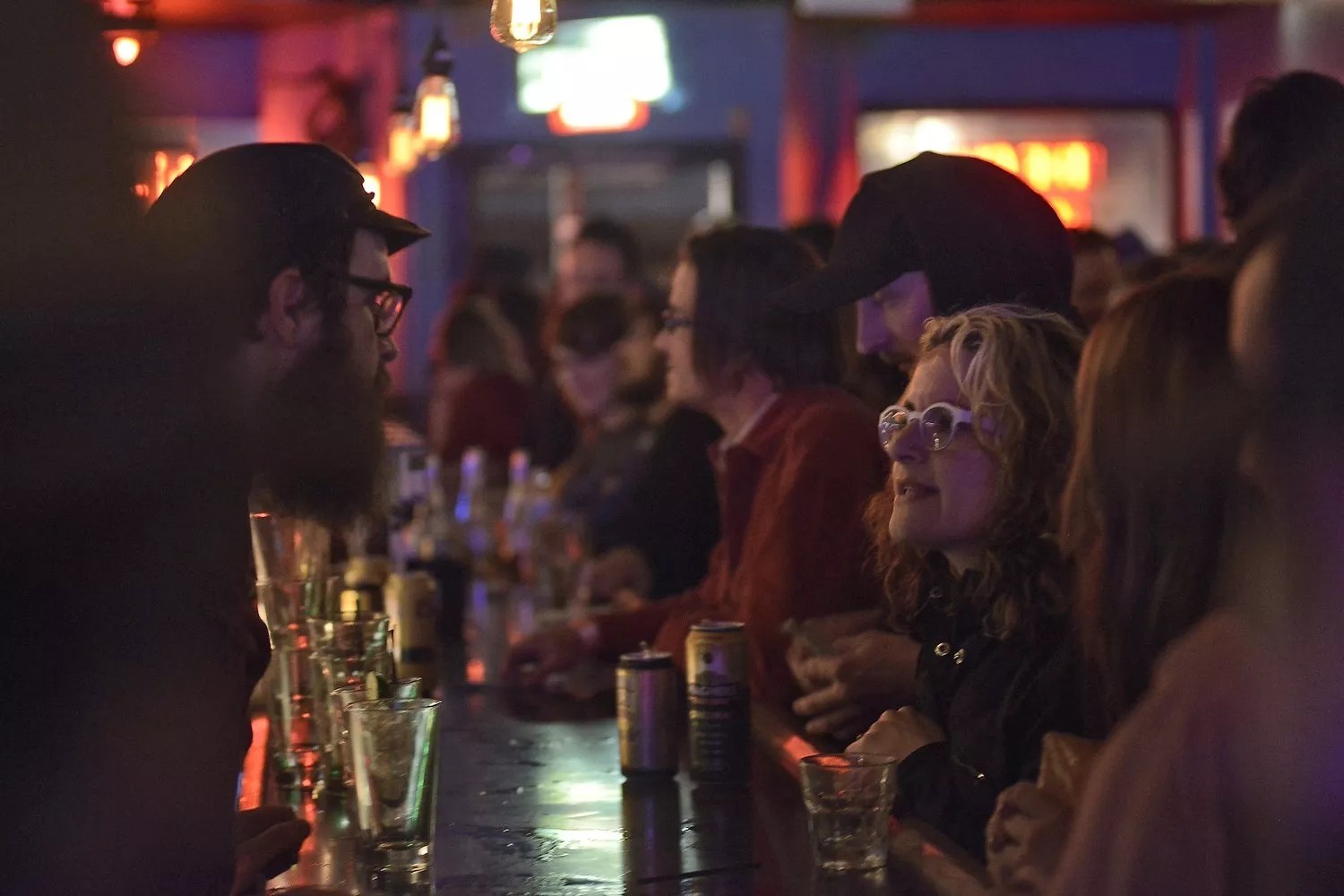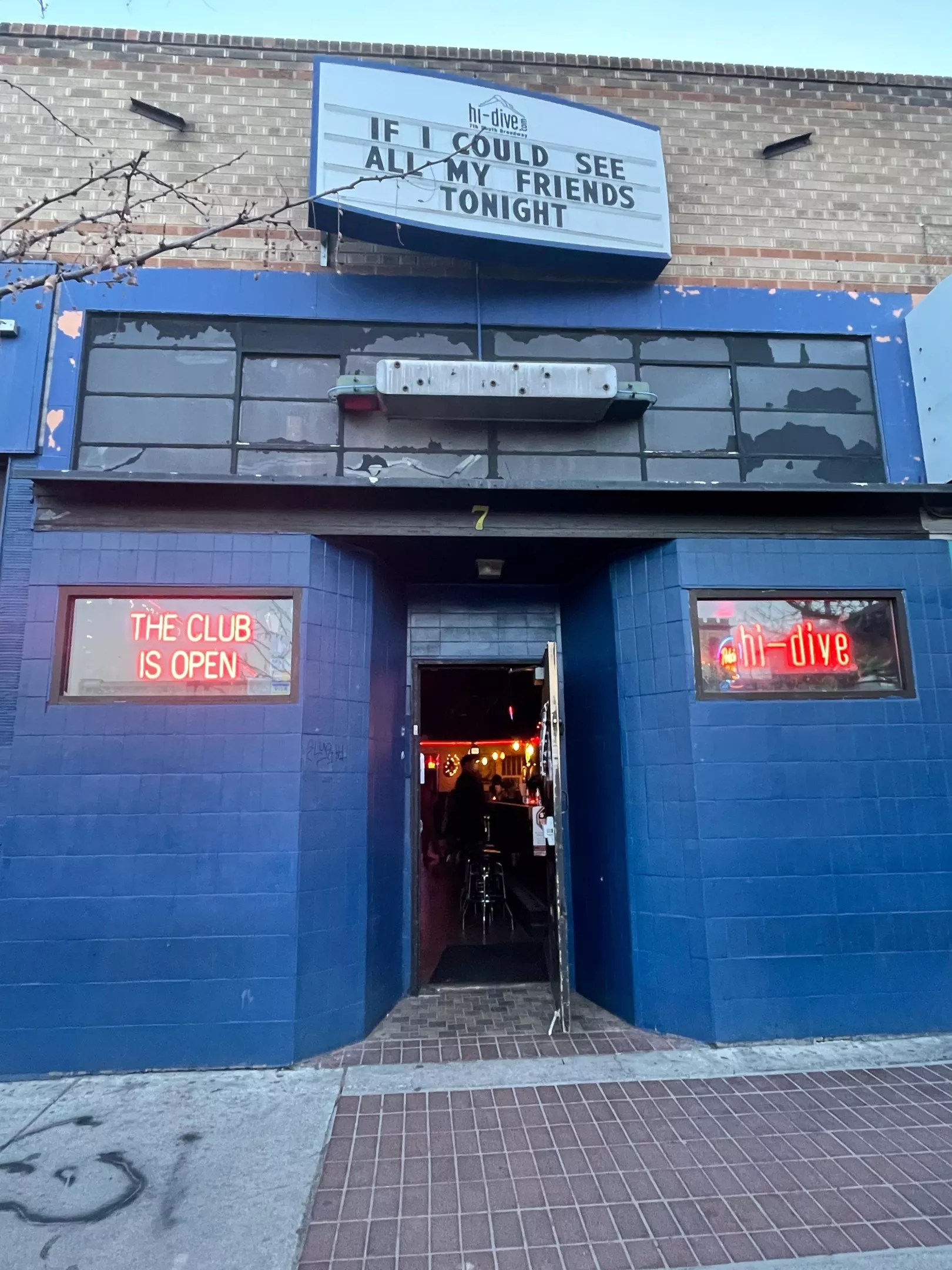
Courtesy Matty Clark

Audio By Carbonatix
This profile was originally published in 2023.
“Ma’am, your profile picture is of Vladimir Putin and your name is Karen. Not really our target market tbh. Thanks for the ‘review’ though!” Matty Clark, who co-owns Denver’s hi-dive along with a core group of investors, shot back at a Yelper who left a one-star review, complaining about the bar’s “hipster high prestige vibes.”
Google Maps did deem it a “hipster hangout,” and the hi-dive, which has won many Best of Denver awards, might appear to be the quintessential dive bar. But it’s also one of the most well-regarded and valued Denver venues when it comes to local-music supporters and bands. It’s where many musicians got their start before making it big and playing such venues as Red Rocks or Ball Arena, including the Lumineers, the Fray and Nathaniel Rateliff, as well as then-small touring acts such as Ty Segall and Beach House. Rateliff took CBS’s Sunday Morning to the hi-dive in 2022 during a segment on the hometown hero, who said the venue was where “we really cut our teeth.”

The venue is one of the best to find rock-and-roll.
Courtesy of Matty Clark
The little blue building at 7 South Broadway has been soaked in liquor and tunes for decades. It lived a past life as the rock venue Seven South throughout the ’90s, then served as the second home to Quixote’s True Blue, a bar dedicated to Deadheads, from 2001 to 2003.
The space was sold to first-time venue owners Matthew LaBarge and Allison Housley in 2003. “Matt and I had moved from Brooklyn a few years prior, and at that time, Denver was a lot more sleepy,” Housley reflects. “We kind of thought it could use some of the places that we used to go to in Brooklyn.
“The Baker district has changed a lot, but back in the day, it was this area where it’s kind of run-down, but it was also where the young artists, musicians, students lived,” she continues. “That was the kind of demographic we were going after, so it just seemed like a good fit.”
They also purchased the space next door and opened Sputnik in 2003. “It’s sort of meant to be a satellite to the hi-dive, so rather than call it a satellite bar, we named it after a satellite. Sometimes people think we’re Russian and get mad that we don’t have a great vodka selection,” she laughs.
Housley doesn’t remember the inspiration for the hi-dive name, and Clark never really knew where it originated. “There’s a number of different hi-dives all over the country,” Clark notes. “But during the pandemic, the owner of the hi-dive in Kansas City went on Instagram and got every hi-dive in the country and sent a message to everyone that said: ‘Do you guys ever get high and think about how many hi-dives there are?'”
Housley admits that back in 2003, she and LaBarge had no idea what they were doing. Despite this, they managed to build a name for the small space, booking local and national acts and becoming the center of a tight-knit musical community. MGMT, St. Vincent and the National are just some of the notable acts Housley remembers from her time there. Two of Rateliff’s previous bands, Born in the Flood and the Wheel, “played [at the hi-dive] a zillion times,” she recalls.

Most of all, the hi-dive is known for its community and support of local live music.
Courtesy of Matty Clark
Clark’s Boulder-based band, Grace Like Gravity, was one of the first groups to play there in 2003. “It was intimidatingly cool at first,” he says, remembering his initial impression of the club. “But then you kind of realized that it was a place for weirdos and for band people, and where you could just be yourself.”
In 2007, he started working at Sputnik and entrenched himself in the music community that the hi-dive fostered, playing shows, booking gigs and serving drinks. He quickly climbed the ranks to bar manager and, eventually, co-manager of both spaces. It was the loose atmosphere and sense of community that drew Clark to the position.
“You’re taking shots with the bartender and you’re listening to really good music, and everybody is interesting,” he says. “There was a real community vibe to it that you wanted to be a part of.”
Housley and LaBarge decided to sell the hi-dive in 2012 to focus on Sputnik and Lost Lake Lounge, which LaBarge opened in 2010 and sold to Larimer Lounge owner Scott Campbell in 2013. They turned to their employees, and Clark purchased it with other co-workers; he is now the majority owner.
Although the hi-dive often strays from its rock-and-roll roots to include alternative, hip-hop and indie acts, much of the iconic venue is the same as it was before the ownership change. Small cosmetic changes, such as a better sound system and air conditioning, make the space more user-friendly.

Courtesy of Matty Clark
Of course, the hi-dive faced its biggest challenge during the pandemic, which shut the venue down until April 2021, with a few sporadic shows in the interim. But considering the venue’s status, it’s no surprise that during the shutdown, it “got such an outpouring of support from the community,” Clark told us last year. “We didn’t even have to ask that much for help; we just got a lot of help. All these bands were wondering if they could do a livestream and donate the proceeds to keep us afloat while quarantine was happening. And it really felt like it became bigger than just me and the other owners. This is what we do for a job, and it sort of became like, ‘Oh, man, we have a responsibility to the community to keep this place going, to give these people a place to create.'”
In 2021, the Live Music Society did a documentary series highlighting small venues across the country – their history, their importance to the community and the effects of the pandemic on the business. The hi-dive was part of that select bunch; view the video at livemusicsociety.org/venuestories.
A sense of kinship and community hangs in the air as much as the scent of booze here. Camaraderie abounds among staff (many are musicians themselves), who create intricate personalized handshakes and inside jokes. “Our main inside joke right now is we blame everything on an ex-employee named Gianni. ‘That was Gianni’s fault,'” Clark chuckles. “He left to go to law school in California. But everything is Gianni’s fault.”

Discover your new favorite band, and meet new friends, at the hi-dive.
Brandon Marshall
Despite the hi-dive’s ballooning reputation as one of Denver’s prime concert venues, fresh faces still grace the stage. “We do a lot of national shows, but we really pride ourselves on the local scene. We want to foster the local scene, support local artists and make sure they get paid well and help them along the way,” Clark says. “It has been fun to watch local bands start opening a show on Thursday night to no one and then work their way up to selling out a Saturday headliner.
“We try to provide a space for people to gather and share ideas and present their projects to each other,” he adds. “If you wanted to get into a band in Denver, I feel like if you started coming to shows at hi-dive and hanging out a little bit, you could find your people here.”
Audiences flock to the hi-dive in particular during the Underground Music Showcase, the annual South Broadway festival featuring up-and-coming acts and local legends, but the club’s calendar is full of stellar lineups year-round. “There was a show before I worked here – it was a band called Liars. That’s still one of the best shows I’ve ever seen,” Clark says, noting that the venue was around a hundred degrees inside, packed fit to bursting with enthusiastic concert-goers.
In 2022, Clark celebrated his ten-year anniversary at the venue. “We had a ten-year anniversary weekend,” he recalls. “I have a lot of fond memories of that, because I was sort of seeing everyone from hi-dive past and present, all in one place. And we had all of these bands that have come and gone throughout the space over the ten years that I had owned it. So that was really cool to reflect on that.”
In an Instagram caption at the time, Clark wrote: “When I die, bury me at seven south.”
Find upcoming concerts at hi-dive.com.